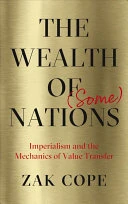The Wealth of (some) Nations – Imperialism and the Mechanics of Value Transfer

Blurb
In this provocative new study, Zak Cope makes the case that capitalism is empirically inseparable from imperialism, historically and today. Using a rigourous political economic framework, he lays bare the vast ongoing transfer of wealth from the poorest to the richest countries through the mechanisms of monopoly rent, unequal exchange and colonial tribute. The result is a polarised international class structure with a relatively rich Global North and an impoverished, exploited Global South. Cope makes the controversial claim that it is because of these conditions that workers in rich countries benefit from higher incomes and welfare systems with public health, education, pensions and social security. As a result, the internationalism of populations in the Global North is weakened and transnational solidarity is compromised. The only way forward, Cope argues, is through a renewed anti-imperialist politics rooted in a firm commitment to a radical labour internationalism.
Book summary
The book explores the imperialist tendency inherent in global capitalism by using a rigorous political economy framework. Overall, the book argues that there is a vast transfer of value from the Global South to the Global North, which is overlooked by the left analysis in the imperialist countries; thereby it affords the mass ‘labour aristocracy’ of the developed countries material benefits at the expense of labour in the underdeveloped countries. The book itself is divided into three parts. The first part lays the theoretical foundations of the key mechanisms by which imperialism operates: value transfer, colonial tribute, monopoly rent, unequal exchange. The second part presents empirical calculations and findings of international value transfer. The third section explores the historical articulation of the concept of the 'labour aristocracy' in the imperialist-country Marxist/socialist thoughts and movements. Lastly, the book contends for the necessity of bringing an internationalist and anti-imperialist dimension into the analysis.

